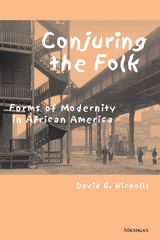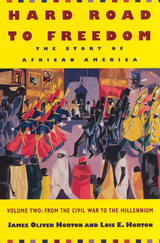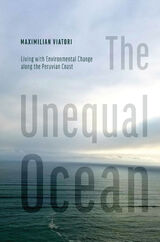2 books about African America

Conjuring the Folk
Forms of Modernity in African America
David G. Nicholls
University of Michigan Press, 2000
Conjuring the Folk addresses the dynamic relation between metropolitan artistic culture and its popular referents during the Harlem Renaissance period. From Jean Toomer's conclusion that "the Negro of the folk-song has all but passed away" to Zora Neale Hurston's discovery of "a rich field for folk-lore" in a Florida lumber camp, Harlem Renaissance writers made competing claims about the vitality of the African-American "folk." These competing claims, David Nicholls explains, form the basis of a discordant conversation on the question of modernity in African America.
In a series of revisionary readings, Nicholls studies how the "folk" is shaped by the ideology of form. He examines the presence of a spectral "folk" in Toomer's modernist pastiche, Cane. He explores how Hurston presents folklore as a contemporary language of resistance in her ethnography, Mules and Men. In Claude McKay's naturalistic romance, Banana Bottom, Nicholls discovers the figuration of an alternative modernity in the heroine's recovery of her lost "folk" identity. He unearths the individualist ethos of Booker T. Washington in two novels by George Wylie Henderson. And he reveals how Richard Wright's photo-documentary history, 12 Million BlackVoices, places the "folk" in a Marxian narrative of modernization toward class-consciousness.
A provocative rereading of the cultural politics of the Harlem Renaissance, Conjuring the Folk offers a new way of understanding literary responses to migration, modernization, and the concept of the "folk" itself.
David G. Nicholls is a post-doctoral fellow in the Center for the Study of Race, Politics, and Culture, University of Chicago.
In a series of revisionary readings, Nicholls studies how the "folk" is shaped by the ideology of form. He examines the presence of a spectral "folk" in Toomer's modernist pastiche, Cane. He explores how Hurston presents folklore as a contemporary language of resistance in her ethnography, Mules and Men. In Claude McKay's naturalistic romance, Banana Bottom, Nicholls discovers the figuration of an alternative modernity in the heroine's recovery of her lost "folk" identity. He unearths the individualist ethos of Booker T. Washington in two novels by George Wylie Henderson. And he reveals how Richard Wright's photo-documentary history, 12 Million BlackVoices, places the "folk" in a Marxian narrative of modernization toward class-consciousness.
A provocative rereading of the cultural politics of the Harlem Renaissance, Conjuring the Folk offers a new way of understanding literary responses to migration, modernization, and the concept of the "folk" itself.
David G. Nicholls is a post-doctoral fellow in the Center for the Study of Race, Politics, and Culture, University of Chicago.
[more]

Hard Road to Freedom
The Story of African America, The Civil War to the Millennium
Horton, Lois E
Rutgers University Press, 2002
Hard Road to Freedom tells the story of African America from its African roots to the political and social upheavals at the end of the twentieth century. It interweaves the experiences of individual black Americans with an analysis of the nation's pursuit of its fundamental principles, of freedom, and civil rights. The book begins with African cultures and the African people who withstood the horrors of the slave trade and slavery to help shape a new multiracial society in North America. The American Revolution brought freedom to some, but most remained in the grip of slavery. African Americans and their allies continually raised the cry for freedom, building determined black communities and dedicated antislavery organizations that contributed to the abolition of slavery. The precarious freedom after the Civil War brought new opportunities, but also new dangers and the limitations of Jim Crow. The wars and the depression in the early twentieth century found black Americans forging new alliances, creating a cultural renaissance, and fighting for democracy and freedom abroad. At home, they struggled against the denials of freedom and citizenship that still barred their full participation and that tarnished America's standing in the eyes of the international community. Throughout the social and political turmoil of the 1960s and 1970s and the political and cultural backlash that followed, African Americans continued to raise their voices in often eloquent and always insistent appeals that the nation live up to the promise of its principles. This book tells of America's unsteady advance along the road to freedom, the triumphs and hope, as well as the failures and despair, from the vantage point of the African Americans who resolutely played a critical role in that story.
[more]
READERS
Browse our collection.
PUBLISHERS
See BiblioVault's publisher services.
STUDENT SERVICES
Files for college accessibility offices.
UChicago Accessibility Resources
home | accessibility | search | about | contact us
BiblioVault ® 2001 - 2025
The University of Chicago Press









